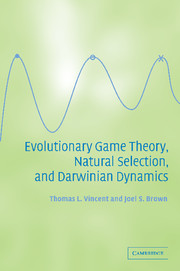Book contents
- Frontmatter
- Contents
- List of figures
- Preface
- 1 Understanding natural selection
- 2 Underlying mathematics and philosophy
- 3 The Darwinian game
- 4 G-functions for the Darwinian game
- 5 Darwinian dynamics
- 6 Evolutionarily stable strategies
- 7 The ESS maximum principle
- 8 Speciation and extinction
- 9 Matrix games
- 10 Evolutionary ecology
- 11 Managing evolving systems
- References
- Index
11 - Managing evolving systems
Published online by Cambridge University Press: 11 August 2009
- Frontmatter
- Contents
- List of figures
- Preface
- 1 Understanding natural selection
- 2 Underlying mathematics and philosophy
- 3 The Darwinian game
- 4 G-functions for the Darwinian game
- 5 Darwinian dynamics
- 6 Evolutionarily stable strategies
- 7 The ESS maximum principle
- 8 Speciation and extinction
- 9 Matrix games
- 10 Evolutionary ecology
- 11 Managing evolving systems
- References
- Index
Summary
Nature is not an art gallery with a static display of species. Rather, Nature is a rich dynamical system involving both ecological changes in population sizes and evolutionary changes in species' number and strategies. This is never so apparent as when humans modify the environment or attempt the daunting task of managing species. Habitat destruction, competing land use objectives, harvesting, and even relatively benign changes to environments can threaten the viability of a species' population. At the other end of the management spectrum, many exotic invasive species, diseases, and agricultural pest species defy control efforts. Understandably, most management and conservation of species focus on ecological dimensions and principles. Yet, all species have evolutionary dynamics as well. Rapid evolutionary responses are commonplace (Ashley et al., 2003). Antibiotic resistance in bacteria can evolve within months or years. Pesticide resistance and herbicide resistance in insects and weedy plants can occur within years or decades. Within the span of a few decades (and less), the hand weeding of plants from Asian rice paddies has selected for weed seedlings that mimic the look of rice plants. The mechanical seed-sorting technologies of mechanized agriculture have produced weed ecotypes that mimic the flowering phenology and seed characteristics of grain crops. Newly established island populations of rodents show rapid evolutionary changes (usually increases) in body size and concomitant changes in skull morphology. Red squirrels have expanded their range south a few hundred miles into central Indiana, USA.
- Type
- Chapter
- Information
- Publisher: Cambridge University PressPrint publication year: 2005



